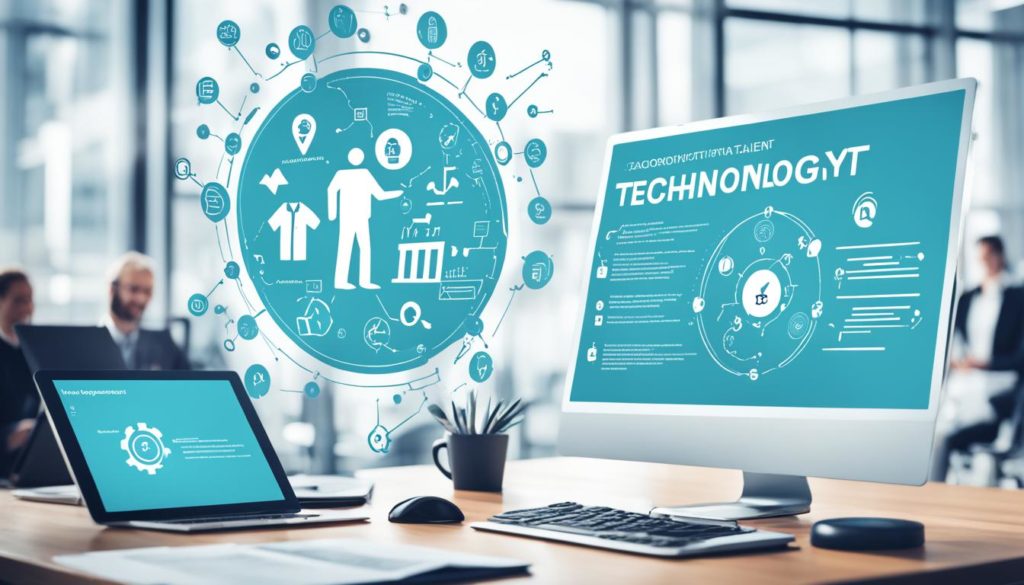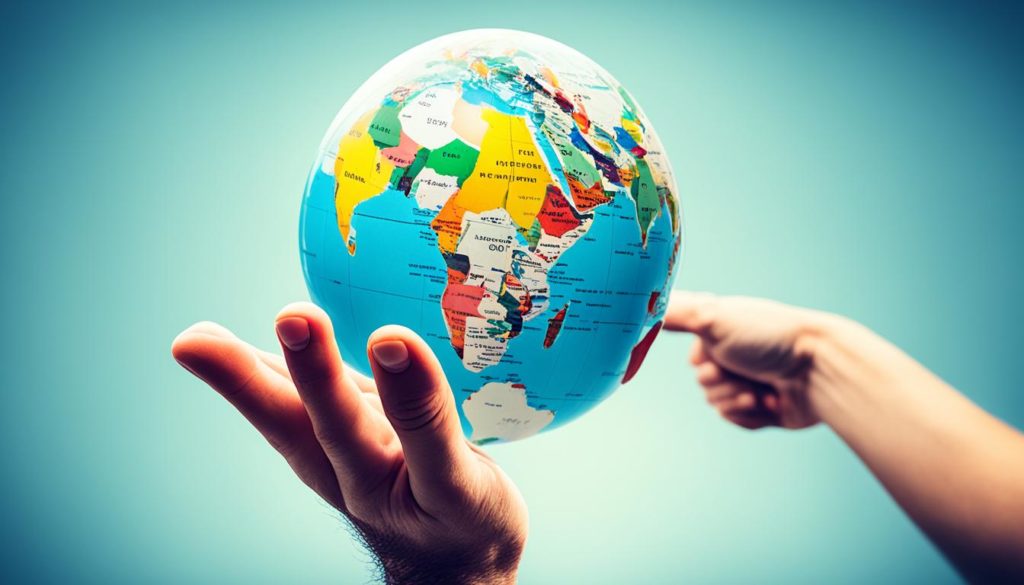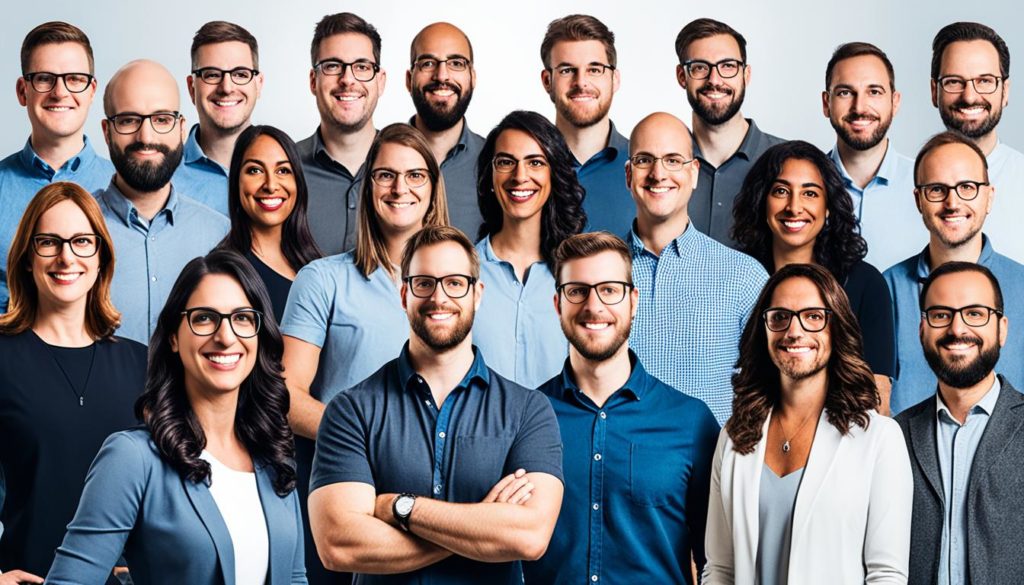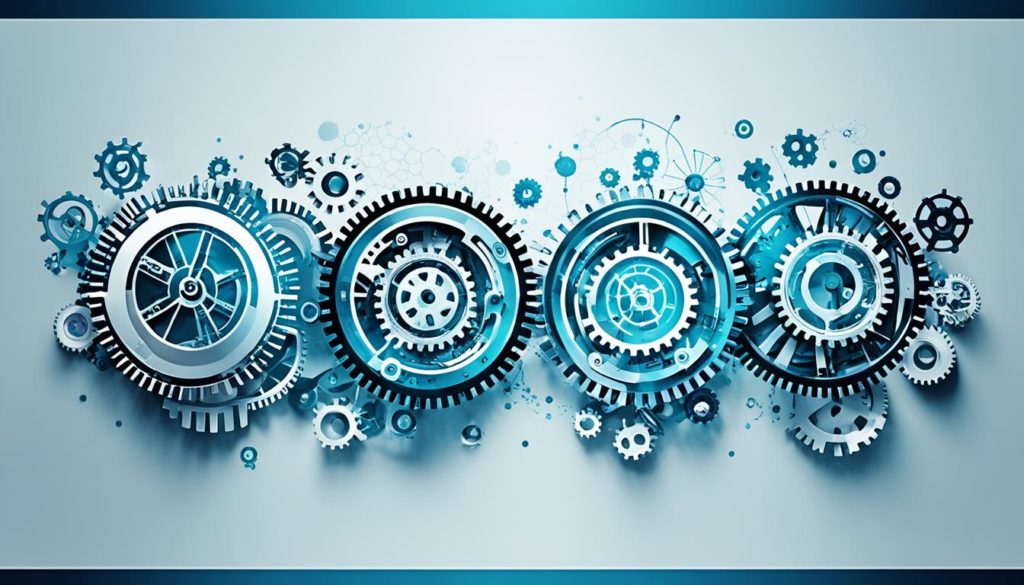
Did you know mentions of AI on earnings calls shot up by 366%? This shows just how quickly artificial intelligence is becoming a part of various fields, including recruiting. AI in hiring isn’t a future idea anymore. It’s already changing the way we find and pick people for jobs. Companies like Google and LinkedIn are using AI to sort through resumes fast and link job seekers with the right positions. It’s clear that AI is making a big splash in how we recruit.
But here’s a surprise: 61% of Americans don’t know how common AI is in recruitment. This shows a big chance to teach people about what AI in hiring can do. AI isn’t just making things faster and easier. It’s also making it better for people looking for jobs and helping companies make smarter choices. By using AI, the whole process of finding new talent is getting a major upgrade.
Key Takeaways
- AI mentions have increased by 366% on earnings calls.
- Companies like Google and LinkedIn are leveraging AI for recruitment processes.
- 61% of Americans are unaware of AI’s role in hiring.
- AI in recruitment enhances efficiency, speed, and candidate experience.
- Raising awareness about AI’s role can maximize its benefits in talent acquisition.
Introduction to AI in Recruitment
AI is changing the game in finding and hiring people. By using machine learning in HR, we make automated recruitment processes better and faster. This way, HR can work more efficiently. The smart algorithms in AI-powered candidate screening let us look through lots of data quickly. This helps HR teams make smarter choices.
Big companies like Google and LinkedIn show how big a difference AI can make in hiring. Google uses AI to find the perfect match for jobs based on someone’s skills and past work. LinkedIn uses AI to suggest jobs to users and help recruiters find good candidates. This makes finding jobs and hiring much easier and more effective.
AI doesn’t just make matching candidates faster and more precise. It also adds a strategic layer to HR through powerful data analysis. With predictive analytics, HR can predict future hiring needs. They can see where skills are lacking and plan ahead to fill those gaps.
Here’s how AI is changing different parts of hiring:
| Aspect | Traditional Recruitment | AI-Powered Recruitment |
|---|---|---|
| Resume Screening | Manual review, time-consuming | Automated screening, faster, more accurate |
| Candidate Matching | Based on job descriptions | Uses predictive analytics, better fit |
| Job Recommendations | Generalized, not personalized | Tailored to individual profiles and preferences |
AI is doing more than just speeding up tasks in hiring. It’s changing HR’s role to be more strategic and data-focused. This leads to smarter hiring choices and a stronger team.
Benefits of Using AI in Talent Acquisition
Using technology in talent acquisition brings many good things that can change how we hire. It makes things faster by quickly checking lots of resumes.
Efficiency and Speed
With AI in recruitment advantages, we can look at thousands of applications quickly. This helps HR people focus more on planning and talking to the best candidates. It improves how we find and keep talented people.
Enhanced Candidate Experience
AI also makes things better for those applying for jobs. Chatbots can answer questions right away, making things more personal and supportive. This makes candidates feel more at ease and keeps them interested.
Data-Driven Decision Making
Lastly, predictive analytics in talent acquisition helps us make smarter choices. AI helps us be fair and less biased when we hire. This means we can build diverse teams that are more likely to succeed. Companies can get better at hiring, aim for the future, and keep employees happy.
How AI is Being Used in Recruitment Today
The way we hire is changing fast, thanks to AI and new tech. AI makes hiring quicker, fairer, and more efficient. It’s interesting to see how AI is reshaping key parts of hiring.
Resume Screening
Many companies now use AI to check resumes. These tools quickly find applicants who fit the job well. HR folks save time and avoid bias, making hiring fairer for everyone.
Already, 43% of HR professionals are using AI. It’s a big part of why hiring is getting better. Learn more about this at AI is changing the hiring process.
Job Description Writing
AI is upgrading job postings too. It makes sure job ads invite everyone qualified and do not leave anyone out. This helps find a wider range of talented people.
The AI market could hit $1.8 billion by 2030, showing how much people trust it. Using AI in job ads helps avoid turning people away with unclear descriptions. Find out more at AI transformation in recruitment.
Candidate Sourcing and Screening
AI tools are changing how we find and pick talent. They quickly sort through information to highlight the best candidates. This means we can hire good people faster and more accurately.
AI tools also make welcoming new employees feel special and tailored to them. As AI grows in HR, it’s important to keep a good balance with the human touch. Check out more at AI in HR continues its growth.
| Role of AI | Impact on Recruitment |
|---|---|
| Resume Screening | Efficient and unbiased candidate filtering |
| Job Description Writing | Inclusive and targeted job postings |
| Candidate Sourcing | Faster and accurate talent identification |
| Onboarding | Engaging and personalized experience |
AI Recruiting Software: Driving Innovation
AI recruiting software leads in recruitment innovation. It brings a tech-savvy way to find and hire talent. These platforms can automate tasks, analyze job trends, and predict hiring needs.
This software is the heart of data-driven hiring strategies. It helps businesses stay ahead in changing job markets. AI tools improve hiring quality and make recruitment cost-effective. They show the power of new technology in hiring.
Companies using AI in hiring become more efficient and match with candidates better. This technology doesn’t just speed up hiring. It revolutionizes it, making it smarter and tuned to industry needs. With AI, recruiters make smarter choices, filling jobs faster and improving the hiring process.
In talent acquisition, AI recruiting software changes the game. It brings insights and efficiency, helping companies win the talent race. By adopting AI, the future of hiring will be faster and more effective.
Challenges and Ethical Concerns of AI in Recruitment
AI has great benefits in recruitment. But, we need to look at some challenges and ethical issues. This way, we can use it responsibly to its full advantage.
Bias and Fairness
Bias and fairness are big challenges in AI for hiring. AI trained on flawed data may keep old biases. This leads to concerns about fairness in jobs. To keep AI fair, we must closely check and keep improving its decisions. This helps avoid any bias by mistake.
Privacy Concerns
Using AI in hiring means dealing with a lot of personal information. This raises privacy worries. We must be clear about how we protect this data and follow privacy laws strictly. Doing this tackles the main AI issues without risking people’s privacy or trust.
Candidate Experience Balance
AI helps make hiring faster, but we shouldn’t lose the personal touch. It’s key to find a good blend. Ethical AI should keep the hiring process warm and human. This way, candidates feel valued and stay interested from start to finish.
Implementing AI in Recruitment Strategies
Adding AI into recruitment needs a careful plan. Start with small projects like HR AI training to see big benefits. This approach ensures success.
Start Small and Research Tools
Beginning with AI in hiring, it’s important to focus on a few areas first. Using AI resume screening or chatbots can give quick results. It’s important to research AI recruitment tools to find the right fit for your needs and budget. With over half of managers looking into AI soon, getting started is key.
Employee Training
Training HR teams to use AI is vital. Offering HR AI training ensures they can use tools right and ethically. Such training helps speed up hiring while being fair, according to 86.1% of recruiters.
Monitoring and Adjusting
It’s crucial to keep an eye on how AI tools perform. Using recruitment strategy analytics helps adjust tactics as needed. Checking data regularly helps make your strategy better. AI has cut hiring time, say 44% of recruiters, showing its worth.
Also, 42% of recruiters feel AI makes them more strategic. Fine-tuning AI use based on data can boost your hiring efforts significantly.
| Benefits | Statistics |
|---|---|
| Time Savings | 44% of recruiters highlight time savings with AI |
| Candidate Experience | Enhanced and streamlined with AI tools |
| Scalability | AI can efficiently handle large volumes of applicants |
| Cost Reduction | Significant cost reductions in administrative tasks |
| Unconscious Bias Reduction | Minimized through data-driven insights |
Putting AI into recruitment plans requires smart choices and ongoing commitment. Following these steps helps make the most out of AI for innovative hiring.
Conclusion
Using AI in hiring is a big change that matches our digital future. The overview here shows how AI has grown. It’s moved from simple tasks to advanced tools like chatbots and analytics. These tools make hiring faster and help us choose candidates better, improving how we find new talent.
AI also plays a big role in making hiring fairer and more personal. It helps us engage with candidates in a tailored way and judge them more fairly. Yet, we must remember to use AI ethically. As this article points out, being open, fair, and following rules is important. We need to do this to avoid bias and build trust, which helps include diverse candidates.
AI’s future in HR looks bright with ongoing tech upgrades. These include better language and analysis tools. But, we need to mix tech with human understanding for a well-rounded hiring process. As leaders in hiring, we must use AI wisely and keep improving it. This blend of human and AI skills keeps us ahead in finding great talent for the future.
FAQ
What is AI in recruitment?
AI in recruitment uses smart tech to make hiring smoother. It helps in sorting resumes, finding the right people, and setting up interviews.
How does AI improve the efficiency of recruitment processes?
AI checks thousands of applications fast, picks the best fits, and does routine tasks. This lets HR people work on big-picture stuff.
What are the benefits of using AI for candidate experience?
AI makes applying for jobs better by offering chats that answer questions and help out. It makes the process quick and fun.
How does AI help in making data-driven hiring decisions?
AI looks at big data to find trends, helping recruiters choose wisely. It cuts down biases by sticking to the facts.
What role does\n AI play in resume screening?
AI tools check resumes to match skills with job needs, making screening faster and more accurate.
How is AI used in writing job descriptions?
AI helps write job ads that grab attention and are fair. It makes sure the words appeal to the right people without bias.
What innovations does AI recruiting software bring to talent acquisition?
AI software automates tasks, studies job trends, and predicts hiring needs. It keeps companies competitive in finding talents.
What are some ethical concerns associated with AI in recruitment?
The main worries are AI bias, privacy of applicant info, and keeping a human touch in hiring.
How can organizations ensure fairness and reduce bias in AI recruitment tools?
By using varied data for AI, checking its decisions for fairness, and being open about how it uses data.
What are\n the privacy concerns with using AI in recruitment?
Using AI raises questions about keeping personal data safe. Employers must protect this information carefully and be clear about its use.
How should companies start integrating AI into their recruitment strategies?
Companies should pinpoint where AI can help, look into tools, train HR on them, and track the results to keep improving.
Why is employee training important when implementing AI in recruitment?
Training helps HR use AI well, knowing what it can and can’t do. This ensures they blend tech with a personal touch.
How can organizations monitor and adjust their AI recruitment strategies?
Keeping an eye on how AI affects hiring allows for updates for better hiring. Feedback and staying current with AI tech are key.
Future App Studios is an award-winning software development & outsourcing company. Our team of experts is ready to craft the solution your company needs.










